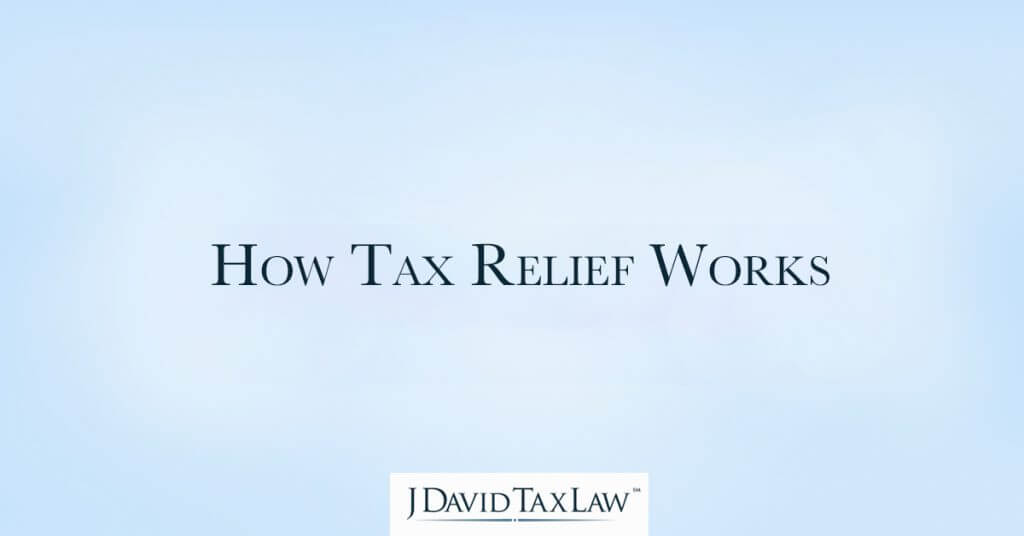Have you heard the term tax relief but aren’t sure how it works or if it’s something you can qualify to receive? The following article provides an in-depth look at how tax relief works, more information on several tax relief programs that can be negotiated, and how to find out if you qualify for tax debt relief.
The Basics of Tax Relief
When facing large tax debt you can’t pay, bank levies, wage garnishments, or Federal or State tax liens, while every case and every person or business is unique, the majority of people need relief from the taxes they owe. Tax relief is simply a reduction (or relief) in the taxes you owe. A tax relief program such as the Fresh Start Program, an installment agreement, currently non-collectible hardship status, offer in compromise, or a penalty abatement are all tax relief methods to help reduce the tax debt incurred by a business or individual. A tax debt reduction is a tax relief method to help reduce tax liability which in turn reduces the taxes you owe. A tax credit is also a tax relief method that covers something you did in your business or your life. It is important to only trust these negotiations to a tax attorney experienced in complex tax matters.
Tax Debt Relief Programs
Not paying the taxes you owe results in interest and penalties; it can impact future tax refunds and can cause issues with obtaining loans, keeping or receiving security clearances, and renewing or keeping a valid passport. There are multiple tax debt relief programs that can be negotiated on your behalf that can provide tax relief for your family or business. While we are not a tax relief company, our firm of tax attorneys are experts at providing tax relief for our clients. We will fight for you as we diligently fight the IRS or State tax agencies to find ways to negotiate and resolve your tax debt in the shortest amount of time.
Installment Agreement
Failure to pay your taxes on time can result in Federal or State tax liens and bank levy actions. An installment agreement is a payment plan with the IRS in which you agree to pay the taxes you owe within a specific amount of time; however, the installments must be paid on time. Often, the IRS or State can mandate a payment plan that you cannot afford. Our tax attorneys are experienced at working with the IRS to negotiate installment agreements that are on your terms, not the tax agencies’ terms. We consistently provide clients relief from Federal or State tax liens, bank levies, and wage garnishments. In most cases, we can get IRS or State wage garnishments released within 48 hours.
Currently Non-Collectible Hardship Status
Since 1997 there has been a provision in the tax code that allows for a Currently Non-Collectible Hardship Status to be negotiated for individuals or businesses that cannot pay their tax liability. Our attorneys have negotiated thousands of Currently Non-Collectible Hardship Statuses for our clients. This status can also be the method in which a wage garnishment or bank levy is lifted when applied correctly. This can be the best option for many people under the heavy burden of Federal or State tax debt. We’ve found over the years that 68% of all people who owe Federal or State taxes can be negotiated into a Currently Non-Collectible Hardship Status when done by our experienced tax attorneys.
Offer in Compromise
An Offer in Compromise or OIC is an agreement between you and the IRS or State that settles your tax liabilities for less than the amount owed. If you can fully pay your liabilities through an installment agreement, described above, it will be impossible to negotiate an offer in compromise by anyone. Do not be scammed by unscrupulous tax relief companies that prey on taxpayers by telling them they can wipe away the tax debt with an Offer in Compromise. To qualify for an Offer in Compromise, you need to file all delinquent tax returns, make all current year estimated tax payments, and if a business owner with employees, make all current quarter federal tax deposits. The Reasonable Collection Potential is how the IRS measures your ability to pay, including your future income. Only 11% of individuals and businesses with tax debt will qualify for an Offer in Compromise. We cannot stress this point enough; many tax relief companies use the Offer in Compromise as a bait and switch tactic. It’s the “we can settle your tax debt for pennies on the dollar” con that you see in the commercials on late night television. Do not fall prey to this tactic. Our tax attorneys are experienced at working with you to prepare and negotiate your Offer in Compromise agreement with the IRS or State, as well as what is included in your Reasonable Collection Potential analysis.
Penalty Abatement Relief
Individuals, small business owners and self-employed individuals may qualify for relief from the penalties incurred from unpaid taxes if they attempted to comply with the requirements of the law, but did not meet their tax obligations, due to reasons beyond their control. Two of the penalties that can be eligible for relief include not paying on time and not depositing certain taxes when required. Our tax attorneys are experienced at working with the IRS or State to negotiate tax relief in various forms including reasonable cause penalty abatement, first-time penalty abatements, and statutory exceptions.
Find Out if You Qualify for Tax Relief
Find out if you qualify for tax relief by scheduling a no-cost professional consultation with J. David Tax Law today. Our tax debt relief solutions are customized to meet your individual or business tax needs so you can overcome your tax problems and successfully get on with your life. We offer flexible payments plans to ensure professional tax presentation is affordable for everyone. We have represented and helped thousands of businesses and individuals throughout the United States resolve their tax debt. Our tax attorneys will fight for you and keep you informed throughout every step of the process.















